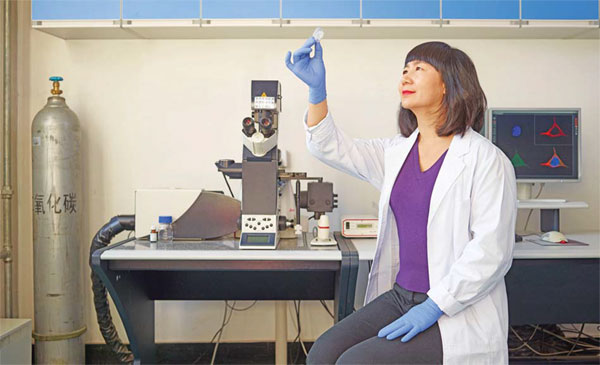Acclaimed scientist waging war on viruses
Lifesaving work earns spot among five winners of For Women in Science Award
Chen Hualan works on the front line of the fight against killer viruses.
Behind the graceful demeanor of this award-winning scientist is someone who is recognized as one of the fiercest warriors in the laboratory.
|
Chen Hualan at her workplace in China's National Avian Reference Laboratory in Harbin. Provided to China Daily |
"Fighting with a virus is a battle," says Chen, 47. "You have to deeply know it and understand it in order to conquer it."
Chen, a professor at the Harbin Veterinary Research Institute in northeastern China, has had some high-profile victories.
In 2013, after the outbreak of H7N9, a deadly strain of avian flu, her team collected more than 1,000 samples from markets, water sources and poultry farms around Shanghai. The data not only proved the virus could spread from birds to humans, but was also used to create a vaccine that has prevented countless infections worldwide.
In March Chen was among the five winners of L'Oreal-UNESCO For Women in Science Award this year for "her outstanding research into the biology of the flu virus, leading to the development and use of an effective vaccine".
The award is given to the world's most influential female scientists and carries with it a $100,000 grant for each laureate. Since 1998 it has honored five women every year, with two going on to win a Nobel Prize.
"Getting this award means my contribution to science has been recognized at a higher level. It means a lot," Chen told China Central Television, the state broadcaster, shortly after accepting her prize at a ceremony in Paris.
Earlier, she was also named among the "top 10 scientists who matter" by Nature magazine for her cutting-edge research in animal virology.
However, Chen says her work is far from over.
"Viruses keep changing," she explains. "If you develop a vaccine to fight against a virus you see now, when you use that vaccine the virus could very well have already changed. This requires us to keep a close eye on viruses (in nature) to understand them.
"We really want to understand what is going on; for example, what kind of birds can be infected by which virus. Then we need very detailed biological analysis to understand the risk of a virus. After that, we will try to develop vaccines."
Her research team has now established a "complete bird flu vaccine development platform" that will make it easier to control any new strains, she says.
Chen, who heads China's National Avian Reference Laboratory, is also known for her experiments to engineer hybrid flu viruses, such as by mixing genes from the H5N1 and H1N1 strains to prove that mutations can spread through the air between guinea pigs. This work demonstrated the threats posed by emerging strains and led to her developing two new vaccines to prevent potential epidemics.
Since 2004, about 140 billion doses of flu vaccine have been given to poultry in China, as well as several other countries, she says.
"We've provided a lot of support to other countries," she says, recalling that she once sent researchers to Vietnam for six months to help health authorities there combat a flu outbreak. "My science is driven by responsibility. I hope my research can be a contribution to the world."
Elizabeth Blackburn, joint winner of the 2009 Nobel Prize in physiology or medicine and head of this year's For Women in Science Award jury, says Chen's achievements are an example of "science with the greatest quality and greatest importance" because "her research prevents epidemics".
Jean-Paul Agon, CEO of L'Oreal, also spoke highly of Chen and her peers at the award ceremony in March. "Chinese scientists are among the best scientists in the world," he said. "The work her (Chen's) team has been doing is amazing. I am sure that, year after year, China will be absolutely at the center of scientific discoveries."
After such plaudits, it is strange to hear Chen say she was originally hesitant to enter the field of veterinary medicine - largely because a neighbor in her childhood home in the northwestern province of Gansu had told her "a veterinarian's main job is to castrate animals".
However, she says she forged ahead after encouragement from her mother.
Outside the laboratory, she is also a wife and mother of a son, although her time at home is limited. The last family vacation they took was six years ago, she says.
"When they went out sightseeing, I locked myself in the hotel room to prepare a research paper," she says, laughing.
tuoyannan@chinadaily.com.cn



















